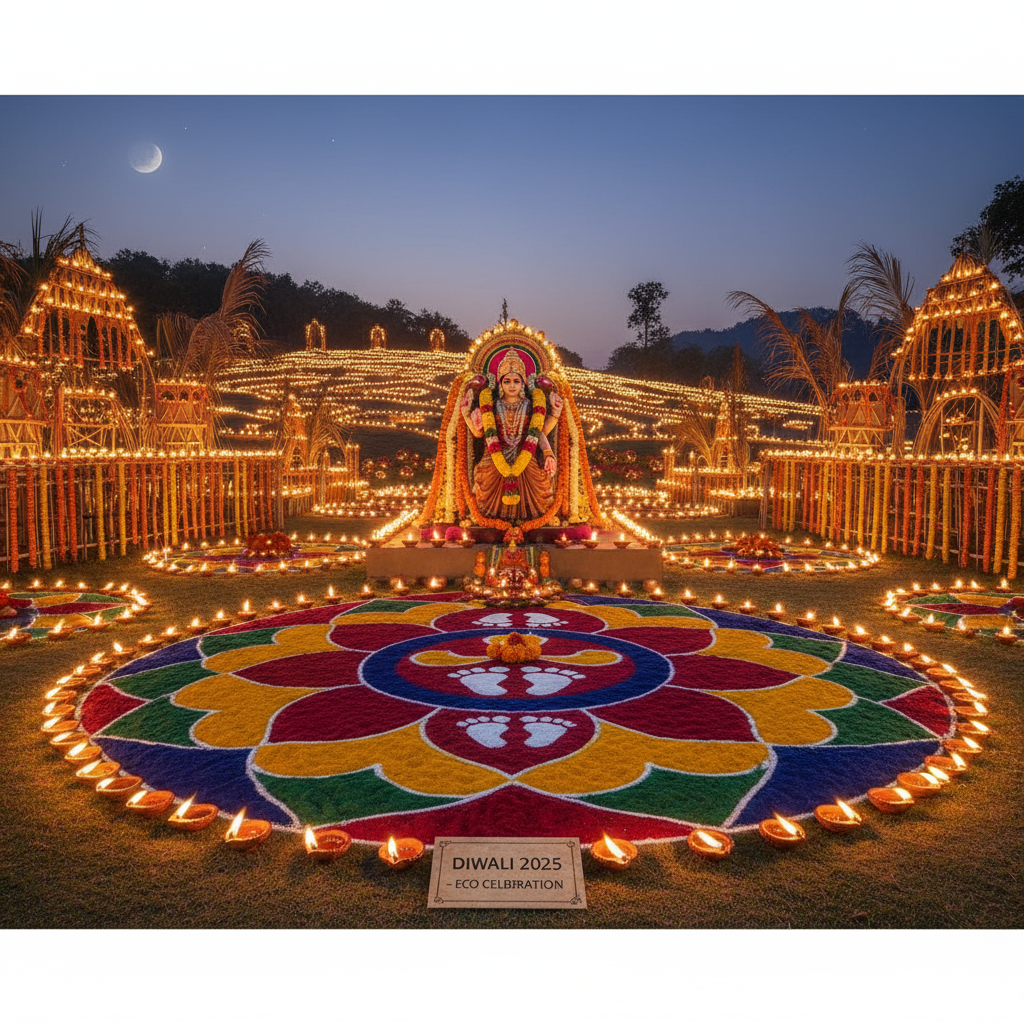Know Your Diwali Lakshmi Puja 2025 Time and Simple Home Rituals
Diwali is called the festival of lights because families light diyas, clean their homes, and pray for good luck and learning. The main highlight is Diwali Lakshmi Puja 2025, when we invite Goddess Lakshmi into our homes with simple prayers, lamps and sweets.

Also Check: How to Celebrate Diwali Without Crackers
Diwali Lakshmi Puja 2025: Date and City-wise Time Idea
Date: Monday, October 20, 2025
Evening muhurat window example: New Delhi reference lists an evening Lakshmi Puja slot around 19:08 to 20:18. Your city can differ by a few minutes.
Tip: Set up your puja space 30 minutes early so the family can start calmly within the muhurat.
Also Check: Pollution Free Paper Crafts for Diwali
Diwali Lakshmi Puja Vidhi: Simple Steps You Can Follow
If you are wondering how to do Lakshmi Puja on Diwali, use this easy sequence.
Clean and decorate: Sweep the entrance, place a small rangoli, keep a diya plate ready.
Set the altar: Place images or idols of Goddess Lakshmi and Lord Ganesha, a kalash with water, flowers, rice, turmeric, kumkum, sweets and fruits.
Light diyas and incense: Keep at least one diya lit near the altar throughout the puja.
Sankalp: Close your eyes and promise to work hard, be honest, and help others.
Offerings: Sprinkle water, apply kumkum and haldi, offer flowers, akshata, sweets and a coin.
Lakshmi mantra for Diwali: Chant slowly for a few minutes.
Aarti: Sing a short aarti for Lakshmi and Ganesha.
Prasad: Share sweets with everyone and wish happy Diwali and Lakshmi Puja to family and friends.
This student-friendly Diwali Lakshmi Puja vidhi keeps the essentials clear and calm.
Easy Lakshmi Mantra for Diwali
You can chant this simple mantra with steady breathing:
“Om Shreem Mahalakshmyai Namah”
Chant softly for 11 or 21 counts. Focus on gratitude and the promise to use wealth wisely for learning and good deeds.
Meaning: Why Lakshmi Puja on Diwali
People ask why Lakshmi Puja on Diwali. On the new moon night, families welcome light, knowledge and prosperity. We pray to Goddess Lakshmi for wisdom in using money well and to Lord Ganesha for clear thinking. The ritual also encourages clean spaces, kind words and generous actions.
Wishes You Can Share
Looking for happy Diwali and Lakshmi Puja wishes for classmates and teachers? Try these short lines:
“Wishing you bright diyas, calm study time and a joyful Diwali Lakshmi Puja 2025.”
“May Lakshmi bless your home with peace and good results. Happy Diwali and Lakshmi Puja.”
“Light, learning and kindness to you and your family this Diwali.”
Helpful Dates Reference
Diwali Lakshmi Puja 2025: Oct 20, 2025. Widely listed for India.
Diwali Lakshmi Puja 2024 date and time: Oct 31, 2024 in India. Exact evening muhurat varies by city, so check your local listing if you are reading this for past projects.
Also Read:
FAQs on When is Diwali Lakshmi 2025? Date, Time, Vidhi, Mantra and Wishes
1. What is the exact date of Diwali Lakshmi Puja in 2025
Diwali Lakshmi Puja in 2025 will be observed on Monday, October 20, which falls on Kartik Amavasya as per the Hindu lunar calendar. On this day, devotees worship Goddess Lakshmi to seek blessings of wealth, prosperity, and happiness.
2. How to do Lakshmi Puja on Diwali at home in a simple way?
Clean the space, set a small altar for Lakshmi and Ganesha, light diyas, offer flowers and sweets, chant a short mantra, do aarti, then distribute prasad. See the step list above.
3. Which mantra is easy for students?
“Om Shreem Mahalakshmyai Namah.” Keep your mind calm and think of gratitude while chanting.
4. What time should we do the puja?
Follow the evening muhurat for your city. As an example, New Delhi shows an evening slot around 19:08 to 20:18 in 2025. Check your local panchang for precise timing.
5. Why is Lakshmi Puja done on Diwali night?
It welcomes light into the home and reminds us to use wealth for good actions, learning and kindness.







